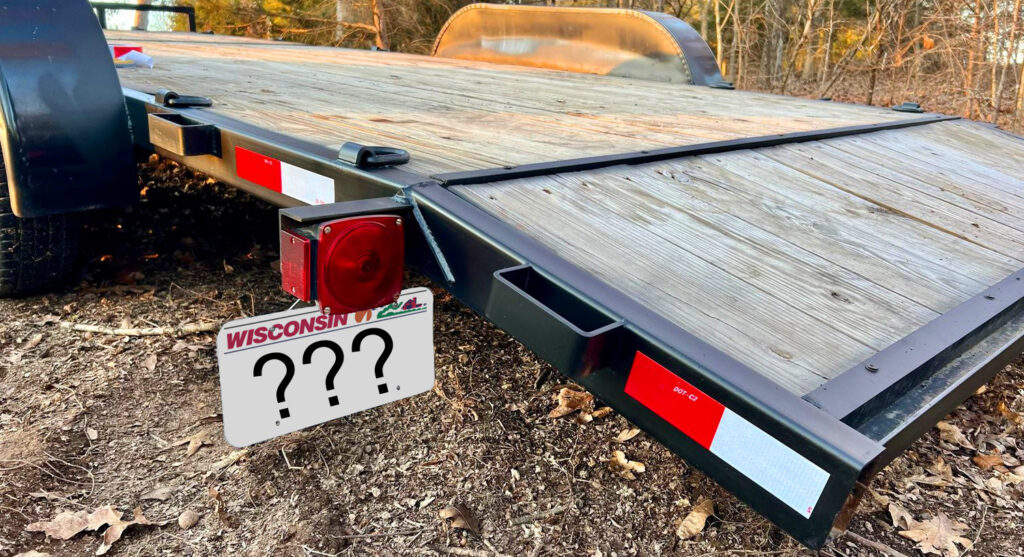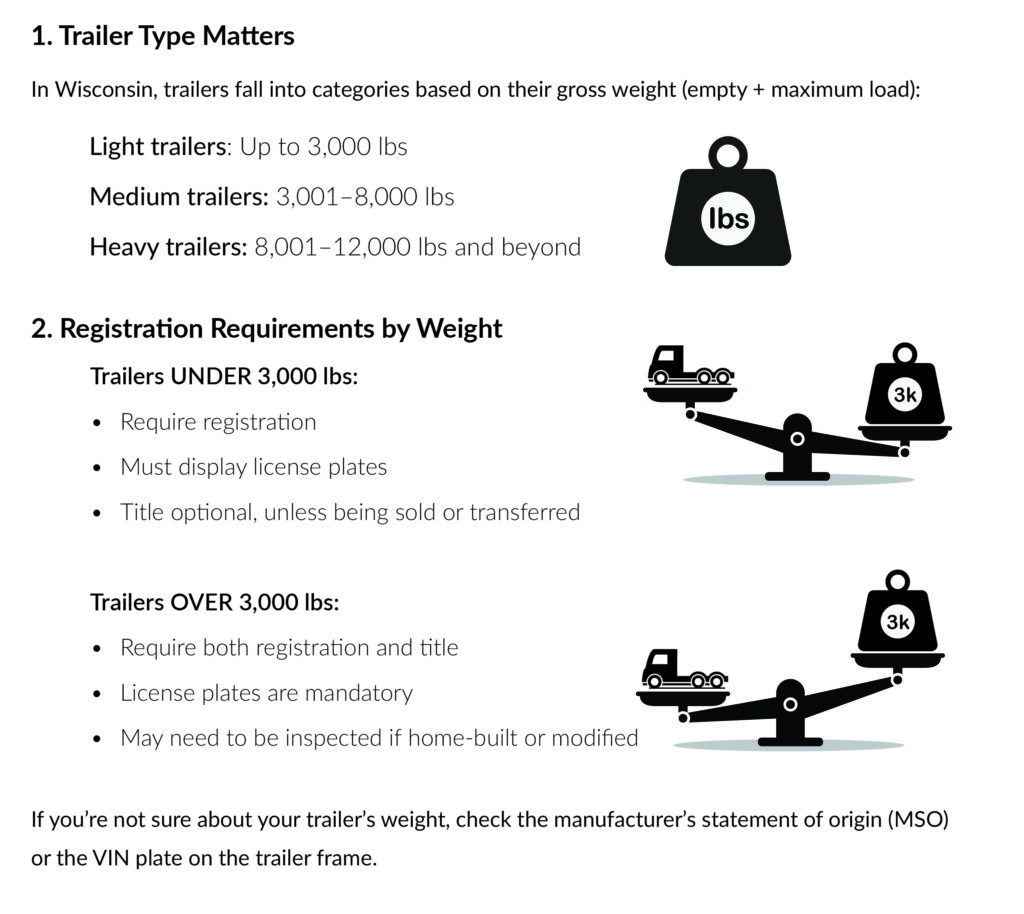Do Trailers Need License Plates in Wisconsin? Trailer Registration Laws Every Hauler Should Know

If you’re new to the world of hauling—whether you just bought a trailer or you’re shopping for your first gooseneck trailer—you might be wondering, “Do trailers need license plates in Wisconsin?” You’re not alone. This is one of the most asked questions we see here at HandiTrailers, and the answer is more important than you might think.
In this guide, we’ll walk you through everything you need to know about Wisconsin trailer registration laws, Wisconsin license plate requirements, and some key rules that every new hauler should understand before hitting the road.
Do Trailers Need License Plates in Wisconsin?
Yes—most trailers in Wisconsin require license plates.
According to the Wisconsin Department of Transportation (WisDOT) and laws outlined in 1999 Act 80, trailers operating on public roads in the state must be registered and carry valid license plates.
This includes:
- Utility trailers
- Cargo trailers
- Equipment trailers
- Gooseneck trailers
- Boat trailers
- Homemade trailers
So, whether you’re hauling landscaping gear, building materials, or a snowmobile, you’ll need to make sure your trailer is properly registered.
Wisconsin Trailer Registration Laws: The Basics
Before you can get license plates for your trailer, you need to register it with the state. Here’s a simplified breakdown of how Wisconsin trailer registration works.

How to Register a Trailer in Wisconsin
Whether you’re buying a trailer from a dealer or a private party, registering it in Wisconsin is fairly straightforward.
To register a trailer, you’ll need:
- Proof of ownership (e.g., title, bill of sale, or MSO)
- Completed registration application (MV1 form)
- Payment for taxes and registration fees
- A photo ID (for in-person registrations)
You can register your trailer:
- At any Wisconsin DMV service center
- Online via the WisDOT portal – By mail if you’re renewing
How much does it cost?
Registration fees depend on trailer type and gross weight rating. As of this writing:
- Light trailers (under 3,000 lbs): ~$20 annually
- Heavier trailers (over 3,000 lbs): Fees increase based on GVWR
- 4,500 lbs → $50/yr
- 10,000 lbs → $77.50/yr
- 14,000 lbs → $246/yr
- And so on…
- Permanent registration is available for certain trailers (usually over 8,000 lbs), which may save money long-term
What About Out-of-State Trailers?
If you’re buying a trailer from out of state or moving to Wisconsin with a trailer in tow, you’ll need to register it within 30 days of establishing residency or purchase. The DMV may also require a VIN inspection if the trailer is homemade or lacks clear documentation.
Wisconsin License Plate Requirements for Trailers
So once you’ve registered—do you need to display a plate?
Yes, absolutely.
All registered trailers must display a rear license plate. Wisconsin does not require a front plate for trailers.
- The plate must be clearly visible
- Plates should be attached to the rear bumper or frame
- Keep the plate clean and illuminated if hauling at night
Failure to display your plate properly could lead to fines or inspection delays at Wisconsin weigh stations.
Wisconsin Weigh Station Rules for Trailers
While we’re talking about staying legal, let’s touch on Wisconsin weigh station rules—especially for commercial haulers.
Here’s what you should know:
If your vehicle and trailer together have a combined GVWR (Gross Vehicle Weight Rating) of 10,001 lbs or more, you may be subject to federal and state DOT regulations. This threshold is when the Department of Transportation (DOT) considers the vehicle combination to fall under commercial vehicle regulations (as opposed to a recreational vehicle).
DOT regulations may include requirements like:
- DOT number registration
- Driver qualification files
- Hours-of-service (HOS) rules
- Maintenance and inspection records
- Compliance with safety audits
This typically applies to business operations involving transportation, deliveries, or hauling services—even if you’re operating a pickup and trailer instead of a semi-truck. For instance:
- Commercial vehicles must stop at open weigh stations.
- Gooseneck trailers and other heavy-duty trailers used for business can trigger extra scrutiny.
You’ll want to make sure you have proper documentation (registration, proof of insurance, etc.) on hand. Staying in compliance with Wisconsin trailer registration laws helps you avoid headaches, fines, or worse—being pulled off the road.
Are There Any Exemptions?
Yes, but they’re limited and come with some notable caveats. Some small farm trailers, implements of husbandry, and seasonal trailers may be exempt from full registration under specific conditions.
Examples of possible WisDOT exceptions:
- Seasonal trailers such as those used for recreational sporting for transport of ATVs and snowmobiles may only require limited use registration for specific months out of the year
- Farming trailers/vehicles limited to local use may be exempt from certain requirements, but usually still require documentation
So while these exemptions do exist, they are narrow and still often require an application with WisDOT. If you plan on taking your trailer (or any vehicle really) on a public roadway, registration requirements almost always apply.
Bottom line? When in doubt, register. It’s better to be legal and covered than risk getting stopped or fined.
Trailer Titles vs. Registration: What’s the Difference?
You’ll need a title to sell, transfer, or finance a trailer. You need registration and plates to use it on public roads.
If your trailer is homemade, you’ll also need to get a VIN assigned by the DMV, and in some cases, undergo an inspection.
Tips for First-Time Trailer Owners in Wisconsin
Here are a few quick tips if you’re just getting into hauling:
- Double check your GVWR—this affects everything from your insurance to weigh station requirements.
- Always keep a copy of your registration in the tow vehicle.
- Check lighting and brakes regularly—trailers over 3,000 lbs often require working brakes.
- Secure your load to avoid safety violations.
- Label your trailer clearly if it’s custom or lacks a VIN.
Final Thoughts
Yes, trailers in Wisconsin need license plates—and most require registration, too. Whether you’re hauling a gooseneck trailer, moving equipment across town, or setting up for a weekend of camping, understanding Wisconsin trailer registration laws is essential.
At HandiTrailers, we’re here to make trailer ownership easy—from answering questions about Wisconsin license plate requirements to helping you find the perfect trailer for your lifestyle or business.
Still have questions? Reach out to our team or stop by—we’ll be happy to walk you through registration, titling, and anything else that helps you hit the road legally and safely.
